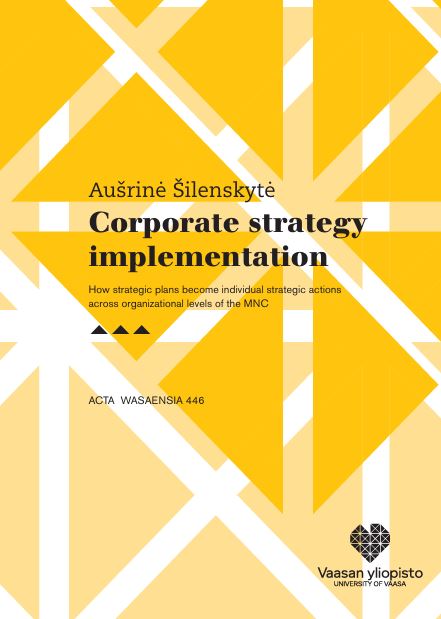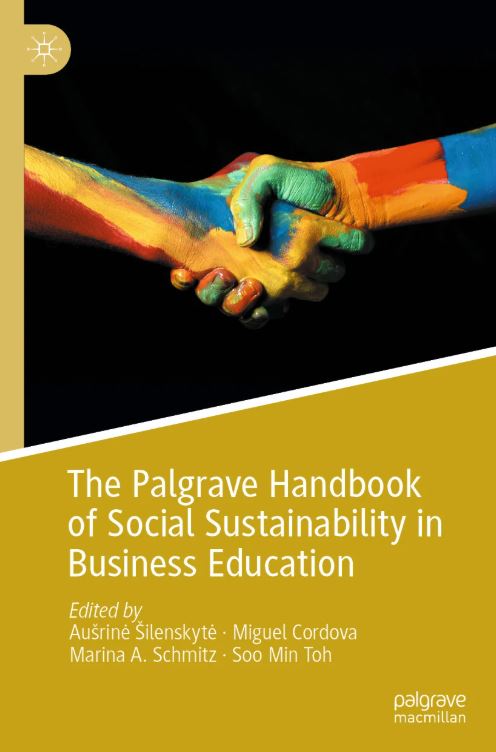 Šilenskytė, A. (2020), “Corporate strategy implementation. How strategic plans become individual strategic actions across organizational levels of the MNC”, Acta Wasaensia 446. Doctoral Dissertation. University of Vaasa. https://urn.fi/URN:ISBN:978-952-476-919-8
Šilenskytė, A. (2020), “Corporate strategy implementation. How strategic plans become individual strategic actions across organizational levels of the MNC”, Acta Wasaensia 446. Doctoral Dissertation. University of Vaasa. https://urn.fi/URN:ISBN:978-952-476-919-8
Managers often cite strategy implementation as the number one challenge in strategic management. Nevertheless, the topic has attracted relatively little attention, and particularly so from the perspective of how individual strategic behaviors emerge that result in successful implementation. Addressing the need to bring in the individual to improve our understanding of these processes, this dissertation aimed to examine how the corporate strategy of a loosely coupled MNC becomes (or otherwise) strategic behaviors of its managers and non-management employees across different levels of the organization.
 Šilenskytė, A., Cordova, M., Schmitz, M.A., Toh, S. M. (Editors) (2024) “The Palgrave Handbook of Social Sustainability in Business Education” Palgrave MacMillan. ISBN 978-3-031-50167-8. https://doi.org/10.1007/978-3-031-50168-5.
Šilenskytė, A., Cordova, M., Schmitz, M.A., Toh, S. M. (Editors) (2024) “The Palgrave Handbook of Social Sustainability in Business Education” Palgrave MacMillan. ISBN 978-3-031-50167-8. https://doi.org/10.1007/978-3-031-50168-5.
First book on embedding the UN’s SDGs into the business curriculum, emphasizing social sustainability.
This book provides a holistic conceptualization of social sustainability, going beyond the topics of diversity, equity, and inclusion, and showcases how the United Nations’ Sustainable Development Goals (SDGs) emphasizing social sustainability can be integrated into business studies’ curricula in different parts of the world. A unique collection of literature comprising educational principles, content, activities, and cases will guide educators, managers of business study programs, and higher education leaders in developing engaging, high-impact educational experiences that enable students to solve grand societal challenges and grow as ethical, inclusive leaders.
This handbook features a wide-range of tested teaching innovations. These cover education models addressing newest trends, such as utilizing artificial intelligence and blockchain technologies in education about-and-for socially sustainable business or skill development for enabling circular economy and sustainable production and consumption patterns. The classical, impactful yet underutilized in business studies instructional techniques such as storytelling and theatre are also discussed comprehensively.
A cross-disciplinary approach of the handbook speaks to scholars aiming to research and implement business education, which connects social, environmental, and economic dimensions in quality education that promotes sustainable development.
In this handbook there are 29 chapters, in six I have contributed as an author:
-
- Chapter 1: Šilenskytė, A., Cordova, M., Schmitz, M.A., Toh, S. M. “Introduction: Social sustainability in business education” (p. 1-23), DOI: https://doi.org/10.1007/978-3-031-50168-5_1
- Chapter 3: Reiman, A., Lindholm, M., Parviainen, E., Šilenskytė, A. ”Human factors and ergonomics in business education” (p. 47-64), DOI: https://doi.org/10.1007/978-3-031-50168-5_3
- Chapter 4: Šilenskytė, A., Žigienė, G., Butkevičienė, J. “Social Sustainability and Advanced Technology Applications in Business: Discussing AI and Blockchain Innovations within Business Education” (p. 65-85), DOI: https://doi.org/10.1007/978-3-031-50168-5_4
- Chapter 8: Serrano, J. C., Diduc, S., Šilenskytė, A., Stephens, M., Nava-Aguirre, K. M. “Fostering Awareness of Social Sustainability in Digital Business” (p. 147-166), DOI: https://doi.org/10.1007/978-3-031-50168-5_8
- Chapter 22: Šilenskytė, A., Butkevičienė, J., Koivunen, N. “Lympo: The complexity of responsible leadership in the emerging blockchain industry” (p. 399-409), DOI: https://doi.org/10.1007/978-3-031-50168-5_22
- Chapter 29: Schmitz, M.A., Toh, S. M., Šilenskytė, A., Cordova, M. “Conclusions: Business education that makes an impact on social sustainability within and beyond the classroom” (p. 533-547), DOI: https://doi.org/10.1007/978-3-031-50168-5_29
Book chapters in edited volumes
- Šilenskytė, A., Carneiro, J. Kohtamäki, M., (2025) “Digital leadership when utilizing software-as-a-service for strategic planning and implementation” (p. 92–109) in in Ed. J. Mark Munoz (2025) “Digital Leadership: Concept and Cases”, Edward Elgar. https://doi.org/10.4337/9781035321247.00013
- Šilenskytė, A. & Rašković, M. (2024) “Embedding Diversity, Equity, and Inclusion (DEI) in International Business Education”, Chapter 15, p. 299-318 in Sinkovics, N., Sinkovics, R.R., Boussebaa, M., Fletcher, M. (Ed.) “International Business and SDG 8: Exploring the Relationship between the IB and Society” Palgrave MacMillan. DOI: 1007/978-3-031-46802-5_15
- Šilenskytė, A. (2022) “Teaching diversity management online: a learning journey for achieving inclusion” (p. 165- 184) in Ed. Bustamante, S.; Saltevo, E.; Schmitz, M.; Martinovic, M. (Eds.) (2022). Shaping a Sustainable Future. Innovative Teaching Practices for Educating Responsible Leaders. Nomos Publishing https://doi.org/10.5771/9783748933090-165
- Šilenskytė, A., Butkevičienė, J., Dhanaraj, C., (2022) “Digital Entrepreneurs’ Strategic Responses to the Incomplete Global Policy Framework for Blockchain-Based Business” Chapter 10, p. 113-126, in Ed. J. Mark Munoz (2022) Digital Entrepreneurship and the Global Economy. New York: Routledge, http://dx.doi.org/10.4324/9781003194798-10